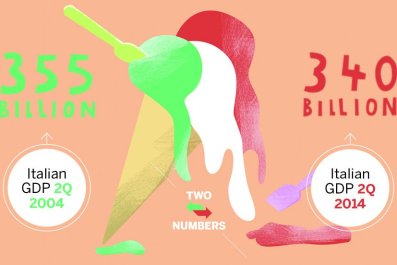Did you know that "estimating a woman's beauty based on the size of her chest is called colposinquanonia?" Did you know bears can count? Speaking of bears, did you know Alaska is "the most eastern, western and northern state?" Here's another one: "China has more English-speaking residents than the United States." Well, I'll be damned.
The above "facts" are culled from three Twitter feeds—UberFacts, Fucking Love Facts and Holy Shit Facts—which do little more than spew such useless tidbits. They aren't the only ones: There's Tech Facts ("Humanity has spent a collective 200,000 years playing Angry Birds," which is scary but not surprising), Celebrity Facts (Isaac Newton, Kobe Bryant, et al.), Facts In Your Face, and Weird Hacks and Facts, in case the tidbit about colposinquanonia just wasn't quite weird enough.
Such is Twitter's love of promulgating fact that publisher Norton has recently released the book 1,339 Quite Interesting Facts to Make Your Jaw Drop. To wit, "Chinese checkers was invented in Germany." It will be hours before I am able to lift my mandible off the floor.
Factualism used to be an occasion for mockery. In Hard Times, Charles Dickens presents us with Thomas Gradgrind, "a man of realities. A man of facts and calculations." The insufferable pedant is "ready to weigh and measure any parcel of human nature, and tell you exactly what it comes to. It is a mere question of figures, a case of simple arithmetic." "Gradgrindian" consequently became an adjective to describe one who is obsequiously devoted to facts. Somewhat tellingly, usage of the word has surged in the past decade.
That's probably because we are all Thomas Gradgrind, at least a little bit. I wouldn't be writing about the Twittersphere's obsession with facts if it were only a passing fad, a hashtag joke destined for digital oblivion. But it isn't. UberFacts has, as of this writing, 7.11 million followers and a stand-alone app, which has 328 reviews for an average of 4.5 stars. "I love this app," one of those reviews says. "I can scroll through it for hours. Full of great information and facts."
Most intriguing, and revealing, is the way UberFacts describes itself: "The most unimportant things you'll never need to know." This is, to put it mildly, a soft sell, though one that cleverly gets at the tacit heart of things. UberFacts knows that you do not actually need to know how many janitors the U.S. has (115,000) or that "napping for just 6 minutes can help improve your memory." But if you're on the UberFacts page, mouse-pointer hovering over the "Follow" button, chances are, you want to know, having developed an insatiable appetite for the useless.
In many ways, what's wrong with UberFacts and its siblings is what's wrong with the Internet at large, which thrives on the dangerous conflation of information and knowledge. This is the Information Age, knowledge having been relegated to some quainter time, like the Renaissance. Everything from Parkinson's disease to the war in Syria has been distilled, bulleted and hyperlinked for your convenience. You have only to click, then click again.
The Internet should have led to widespread enlightenment, a sort of infotopia. It hasn't, though. You could memorize every tidbit trafficked on every fact-based Twitter account, and yet you would know nothing about science, culture or any of the other topics parceled out into 140-character morsels and flung to the masses. On @ScienceTrueFacts, for example, you learn what the Latin motto of Hogwarts means ("Never tickle a sleeping dragon"), followed by the non sequitur that "the color red can make your heart beat faster." Where does that finding come from? How much faster? What about other colors? Most important, why? None of this is touched upon. Having learned that morsel, then, you've pretty much learned nothing of value.
This lack of cohesion makes anything resembling real knowledge impossible: You are left with a thousand pieces from a thousand different puzzles. But that's also the case with almost any average Internet reading experience. Right at this moment, you may well have open tabs for Yelp reviews of a Tibetan restaurant, a #longread about the Middle East, last night's Mariners box score, your email, your Facebook account, your Twitter account and a slideshow of dachshund puppies. There's nothing wrong with that. That's just the way we live, right? Schizophrenic little UberFacts is but a microcosm of the vast, schizophrenic Internet.
In short, TMI—too much information, in case you've been living in a cave or northern Vermont—now plagues us all. Writing recently in Aeon Magazine, British intellectual Dougald Hine described information as "the rawest material in the process out of which we arrive at meaning: an undifferentiated stream of sense and nonsense in which we go fishing for facts." Knowledge is the stuff we often seek, but insight is rare in the frenetic dust storm of the Internet.
In his fine study of the digital age, The Shallows: What the Internet Is Doing to Our Brains, Nicholas Carr suggests that the digital experience is inimical to genuine knowledge acquisition: "The Net's cacophony of stimuli short-circuits both conscious and unconscious thought, preventing our minds from thinking either deeply or creatively. Our brains turn into simple signal-processing units, quickly shepherding information into consciousness and then back out again." The very notion of a Twitter feed suggests the gavage force-feeding that fattens a duck before it becomes foie gras. The dreariest gluttony is one where the subject is helpless. Some might even call it torture.
UberFacts also lays bare the folly of democratizing information, of making every layperson an expert in whatever subject she wishes to assert expert-hood. Earlier this spring, the blog Gizmodo analyzed the UberFacts feed and discovered that many of its facts "are completely wrong or misleading." Of the 64 assertions tweeted out in a single day, Gizmodo found, only 38 were true, not a great batting average for a highly popular purveyor of purported truths. Then again, this is the way of the Web: assert first, verify later.
Or maybe don't bother verifying at all. For example, columnist Lenny Pozner of the Hartford Courant recently reported that "delusional conspiracy theorists" on the Internet continue to claim that the murder of 20 children at Sandy Hook Elementary School two years ago was a hoax. Pozner complained that despite mountains of morbid evidence, these hoaxers were "either unable or unwilling to objectively discern the hard facts from among the fleeting hunches and groundless accusations." UberFacts seems pretty tame in comparison to these hateful maniacs.
You probably think I am going to conclude with a curmudgeonly peroration about the beauty of the written word, the longing of the human spirit for more than fleeting fact. And you're right, sort of. Except the Internet is here to stay, and so are the likes of UberFacts. You might as well rail against the cordless phone. You could move to Idaho and live off the grid, but that's a solution I cannot endorse.
A more mild solution: fight factualism. Actively resist becoming a Thomas Gradgrind, whether in the material or digital world. Do what your aunt in Sheboygan told you after you showed her Foursquare and found her oddly unimpressed: be just a wee bit more attentive to what kind of information you consume, how frequently you consume it, what the costs of that consumption may be. I'd never advocate anything as hokey as mindfulness, but there's nothing wrong in calling bullshit, powering down and walking away. As David Foster Wallace said in his now-famous commencement address at Kenyon College in 2005, "Learning how to think really means learning how to exercise some control over how and what you think. It means being conscious and aware enough to choose what you pay attention to and to choose how you construct meaning from experience."
Of course, I am preaching to myself as much as I am talking to you, reader. As for UberFacts, I have only one word: unfollow.






























